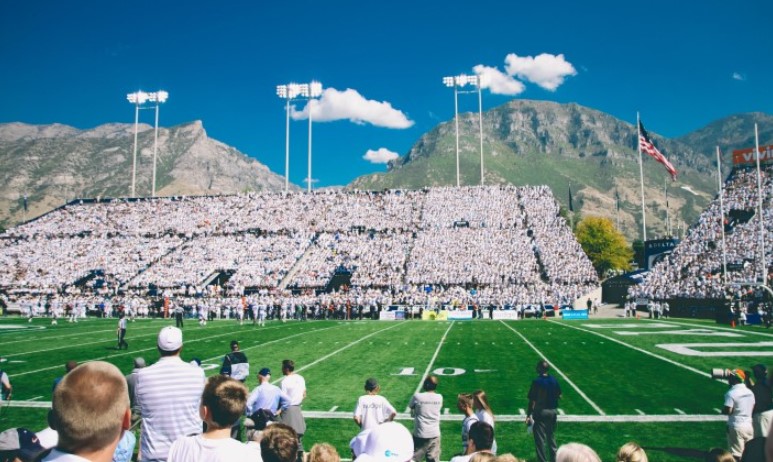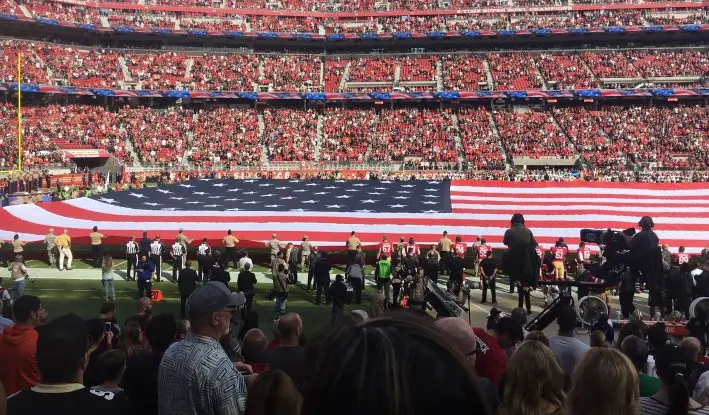Last Updated on October 2, 2023 by Alex PT
A blackout football game is an NFL home game not televised on local television for lack of selling 85% of the tickets within 72 hours before kick-off. NFL designed the blackout policy to encourage the physical attendance of fans during matches.
Why Did NFL Impose the Blackout Football Game Rule?

The primary reason why this rule was crafted was to ensure reasonable live attendance of fans to support their respective teams. The rule was conceived by NFL in the 1970s when the league relied heavily on ticket sales rather than television rights as a revenue source. NFL had been reluctant to drop the rule despite the findings that most fans prefer watching their favorite teams at home on their televisions rather than going to stadiums.
When the Sports Fans Coalition petitioned FCC to drop the blackout football game policy, NFL countered with an argument that the policy was the pillar for them to negotiate televising contracts, which is why most games are televised. On the other hand, most football fans argued that they prefer watching their respective teams from home on bigger screens as opposed to attending live football matches—the reasons for the fans’ displeasure range from time constraints to financial implications.
Who Benefited from the Blackout Football Policy?
- NFL Teams: The primary beneficiaries of this policy were NFL teams, especially those with consistently high attendance. When games were sold out, they were broadcast on local television, which allowed teams to reach a wider local audience. This could potentially increase fan engagement and merchandise sales.
- Ticket Sales: The policy aimed to incentivize fans to attend games in person by creating the threat of a TV blackout if the stadium didn’t sell out. This potentially boosted ticket sales and revenue for teams, particularly in markets with smaller fan bases.
- Local Broadcasters: Local television networks broadcasting NFL games in the team’s market benefited from the policy because it encouraged fans to purchase tickets or attend games in person. This could lead to increased viewership for other programming on these networks.
- NFL League Revenue: The NFL, as a league, benefited from higher ticket sales and in-stadium revenue due to this policy. Additionally, it promoted parity among teams, as it helped smaller-market teams compete with larger-market ones in terms of ticket sales.
The Aggrieved Parties from the Blackout Football Rule
Although a few individuals gained from the rule, most fans felt aggrieved. For instance, the elderly and injured veterans of war who were avid football supporters were debriefed of their right to watch their favorite teams from home.
Another group that found the rule oppressive comprised fans with financial constraints. These fans could not afford tickets and pay the parking fee around the stadium parking area.
Advantages and Disadvantages of Blackout Football Policy
| Advantages of Blackout Football Policy | Disadvantages of Blackout Football Policy |
|---|---|
| 1. Encouraged Attendance: Promoted higher attendance at NFL games by creating a sense of urgency for fans to purchase tickets and attend in person. | 1. Fan Exclusion: Excluded fans who couldn’t attend games due to various reasons, denying them access to televised games. |
| 2. Boosted Ticket Sales: Helped teams increase ticket sales, particularly in markets with smaller fan bases or struggling teams. | 2. Negative Publicity: Sometimes generated negative publicity, portraying the NFL as punitive toward fans unable to attend games. |
| 3. Revenue Generation: Increased in-stadium revenue, including concessions and merchandise sales, benefiting NFL teams. | 3. Economic Disparities: Put economically disadvantaged fans at a disadvantage, as they might not afford to attend games. |
| 4. Parity among Teams: Enabled smaller-market teams to compete with larger-market teams in terms of ticket sales and revenue. | 4. Changing Media Landscape: Became less effective with the rise of alternative viewing options and online streaming, as fans found ways to watch games. |
| 5. Local Broadcasters: Local television networks broadcasting NFL games in the team’s market benefited from increased viewership. | 5. Limited Relevance: Became less relevant as the NFL adapted to the changing sports media landscape and eventually suspended the policy in 2015. |
When Did NFL Impose the Blackout Football Rule?

The blackout football policy existed since the 1950s but was adopted in 1973 when the FCC helped NFL to implement a blackout to games whose tickets were not sold out. The blackout restrictions enabled NFL and the teams to generate revenue since television was not the primary source of income back then.
The policy was stringent, but the NFL stood its ground in defending it, arguing that contrary to the opinion, the policy was why most games were televised. The rule was not only fought by fans, but politicians and other critics also played a significant role in opposing it.
Historically, the NFL teams experienced a decline in fan turnouts during games. The lowest average attendance was recorded in 1998 and 2011. These occurrences indicated that most fans preferred watching the matches from home, but the NFL could hear none.
How Did NFL Drop the Blackout Football Rule

Although NFL dropped the blackout football rule in 2015, it gave back a spirited fight to its opposers. It all started with the Sports Fans Coalition (SFC) complaint. The SFC, chaired by David Goodfriend, complained to FCC, claiming that its blackout rule was a bad example. SFC questioned why the government subsidized the sports leagues at the expense of fans. A petition was filed for rule-making at the FCC, and numerous interested groups joined in the push to end the blackout rule.
A Fightback from NFL
The NFL didn’t sit pretty and allow SFC and other interested groups to carry out the day. The league hit back with all its resources and power as it stood its ground. One of the arguments they fronted was that dropping the blackout would make football games less TV-friendly.
Although it was clear to all and sundry that the football blackout policy was meant to maximize revenue, NFL argued that the policy ensured that games were televised! How so?
SFC debunked NFL’s claims by bringing in economists from Stanford, Chicago, and Michigan Universities to prove why NFL’s local blackout policy made no economic sense.
The Dropping of the Blackout Football Rule
Despite the fightback from NFL, the Sports Fans Coalition carried the day as FCC suspended the policy in September 2014 after voting unanimously to end the rule.
Even though NFL defended the policy with all its mighty, the rule had a few flaws. For instance, games could still be broadcasted even if the home team didn’t sell out the seats or the club’s expensive luxury box. To Mitigate these shortcomings, advertisers had to buy unsold tickets to ensure that the game was televised even with empty seats!
Frequently Asked Questions about the Blackout Football Game Policy
When Was the Blackout Policy Introduced in Football?
The establishment of the blackout policy can be traced back to the 1950s but gained more credence from 1973 to 2014. During this period, the NFL maintains this policy on all home games. As a rule, all teams without 85% ticket sales within 72 hours before kick-off could not air on TV locally for fans to watch from the comfort of their homes.
Is the Blackout Policy Still Effective in Football?
No! The NFL officially dropped the blackout rule in 2014, ahead of the 2015 season. This decision was unanimously made after a voting process involving all NFL clubs.
The Final word
The blackout football rule was primarily crafted to help the league and football teams generate income. However, as time passed, television broadcasting overtook the tickets in revenue, but NFL was not ready to cave in and drop the policy. Persistent pressure from fans, politicians and other interested groups forced NFL to drop the archaic rule.
Reference 1: National Football League television blackout policies – Wikipedia

Hi! I’m Alex PT. I hold a Bachelor’s degree in Sports Management from Indiana University and have over seven years of valuable experience working in a Sports Event Management Company. I founded SportBlurb with the passion for bringing you the latest, most insightful, and engaging content in the world of sports. So, whether you’re a die-hard fan or want to stay informed, I’ve got you covered!

